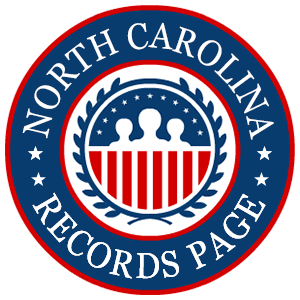Find free North Carolina criminal records via official agencies and gain insight into a person’s past.
Whether you’re looking for North Carolina arrest records, criminal proceedings, probation or parole details, warrant information, state or federal prisoners, if someone is on the sex offender registry, or wanting to run a background check, this article provides everything you need to know, making the process quick and efficient.
How To View Criminal & Arrest Records in North Carolina
As covered in the North Carolina public information search tutorial, criminal, arrest and many other records, are publicly accessible unless the record is sealed, expunged, or a juvenile record.
Note: The search tutorial also provides further insight into many other record types citizens may be seeking, including information on court cases, property, birth, death, marriage, divorce, and more.
The North Carolina General Assembly has passed a public records law known as the NC General Statutes § 132-6-6.2 which stipulates and mandates that public records including criminal and arrest records should promptly be provided to members of the public with no proof of purpose but with some exception.1
These exceptions include court records that have been sealed, juvenile records, photographs of the crime scene and fingerprints of offenders, etc.
Records requested may or may not be certified—the fees to certify these records shall be provided by law, and except as otherwise provided by law, no public agency should charge a fee for a copy (uncertified) of a public record that exceeds the cost of the agency producing a copy. This implies for the most part, viewing North Carolina arrest records is generally free or at little cost.
In addition to obtaining information directly from government entities, there are a number of third-party websites that will provide the service of searching for public records for a fee. This makes the process faster, easier, and may also provide some sense of privacy.
Differences Between Criminal Records & Arrest Records in NC
Criminal record searches and arrest record searches will have a number of marked differences due to the purpose of the record.
Arrest records generally pertain to an individual’s interaction with law enforcement when they have been taken into custody for allegedly committing a crime—this information may include charges, bond amount, and arresting agency.
Criminal record searches will provide information of offenders who have had interaction with law enforcement and have been convicted of the crime they were charged with in the courts. They will generally have information such as court case number, date of conviction and guilty pleas if any.
Criminal Records Consist of:
- Full Names
- Date of Birth (DOB)
- Age
- Sex
- Race
- Case Numbers
- Court Information
- Addresses (former and present)
- Type of Conviction
- Guilty Pleas (if any)
- Date of Conviction
- Charges of the Court (felony or misdemeanor charge)
- Date of Release
- Mugshot (photograph)
- Former Arrest Records
- Date of Disposition
Arrest Records Include:
- Names of the Arrested Individual
- Booking Number
- Court Case Number
- Age
- Address
- Gender
- Arresting Agency
- Date of Arrest
- Arrest Location
- Cell Number
- Charges
- Warrant Information
- Severity of the Charge
- Bail Amount
How To View North Carolina Arrest Records, the Reason for Detainment, & Mugshots for Free
North Carolina arrest records can be retrieved from the county sheriff’s offices, local police departments and city jails at no cost to the requesters.
County sheriff’s department will many times have online rosters where arrests may be viewed. Members of the public may also physically visit sheriff’s offices to ascertain this information or make a phone call when wondering how do they know if they have been charged with a crime.
It is possible that information on current arrests may be withheld and there may not be a complete arrest report available, especially if it may jeopardize an ongoing investigation or severely infringing on an offender’s privacy such as obtaining fingerprints.
For the most part however, the rules of discovery in a criminal case will require for the information to be provided to the public— therefore, an offender’s record will display information such as date of arrest, reasons for arrest, and the arresting agency.2
Perform an Arrest Records Search via County Sheriff’s Offices Throughout North Carolina
Other than local police departments, the county sheriff’s offices are a viable law enforcement agency to obtain information on recent arrests. The state of North Carolina has 100 counties, with each one having a sheriff’s office.
Many of these sheriff’s offices will maintain online rosters of offenders in custody and several will have photographs of the arrestee in the mugshot database which is part of the arrest record. Using online search features to find out if someone is in jail and locating daily arrests is not only free, but it’s the quickest method if a county hosts this information online. Otherwise, calling them is the next quickest option.
In cases where there is no online roster, citizens may physically visit the sheriff’s office or make a phone call in case they are not able to find recent arrests online. The sheriff’s offices typically provide the most viable way how to find recent arrests.
The image below shows an inmate’s details from the inmate inquiry tool provided by the Cabarrus County Sheriff’s Office.
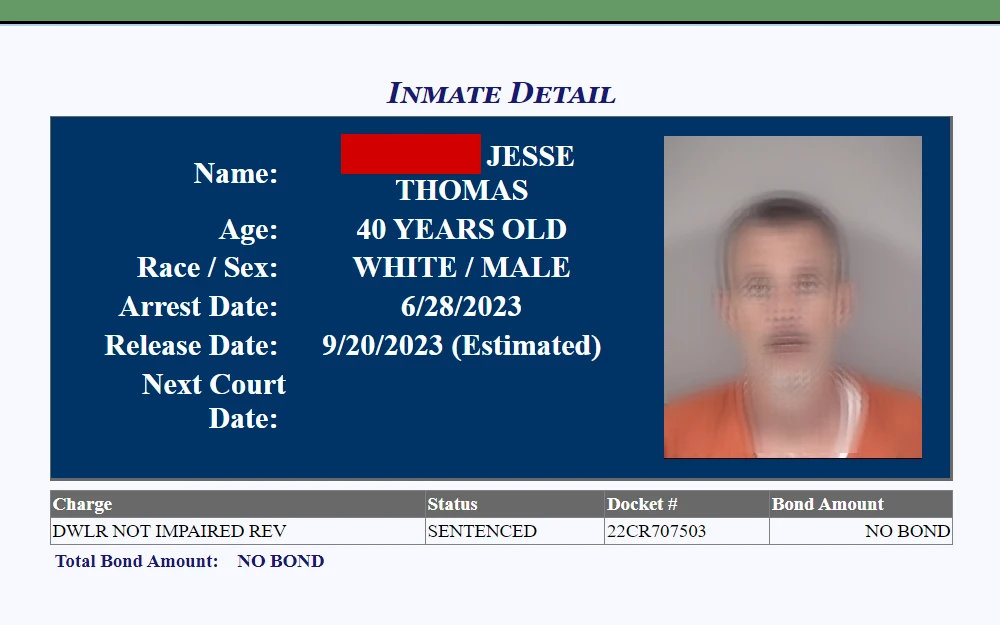
The table below provides links to online rosters for sheriff’s offices in all 100 counties. Those that don’t have an online roster will have an (*) next to the link, which will instead point to a contact page that can be used to contact the law enforcement agency and find detailed information on who’s in jail.
There is also a column that displays whether or not mug shots can be viewed for those with rosters:
Tip: In addition to the search tools and office contacts linked and listed above, anyone seeking inmate records can find further guidance in the overview of looking up anybody incarcerated in jails or prisons throughout North Carolina at no cost.
Check Municipal Jails & Police Department Inmate Rosters (NC)
In addition to finding recent arrests in county jails, members of the public can locate inmates who have been recently booked in city jails in local police departments. The Southern Pines Police Department maintains a database that shows recent arrests.
However, just like with counties, some cities may not maintain online rosters. In cases like this, interested individuals can either phone or physically visit the local law enforcement agencies to obtain this information. Therefore, citizens looking at how to find out someone’s charges in jail can look to the city jails as well when ascertaining this information.
When applicable, type “[name of the city] North Carolina arrest search” into a search engine to see if the local police department hosts an online inmate roster.
Many police departments in North Carolina, such as the Southern Pines (See “Police Data & Alerts), partner with Citizens Connect to publish online arrest reports.
The following North Carolina towns’ and cities’ arrest logs can be searched through Citizens Connect:
- Aberdeen
- Bessemer City
- Forest City
- Pinehurst
- Southern Pines
- Greensboro
How To Get Ahold of Someone in a North Carolina Jail & Post Their Bail
Members of the public can communicate with offenders through phone, mail, and in-person visitations—they can also help get offenders out of jail by posting bail on their behalf.
Contacting an Inmate
Prisoners who are located in county jails may communicate with family and friends, but each facility has its own protocols, and members of the public should contact the sheriff’s office to ascertain what are the procedures for establishing communication.
Generally, contacting an inmate can be done in 3 ways:
- In-person visitations or video visitations
- Inmates may make outbound calls but typically do not receive calls
- They can also send and receive mail
In-Person Visitation—For illustrative purposes, the Pender County Sheriff’s Office is used to give an impression of some visitation protocols that can be expected:
- The dress code is strictly enforced, and the visit time is limited to 15 minutes for every session.
- Children can visit as long as they are accompanied by an adult. A maximum of 2 adults per inmate are allowed to visit.
- Visitors must have a government-issued ID.
- Visitors must be on a visitation list or cannot visit, etc.
Calls—Inmates cannot receive calls but can make outbound collect calls.
Mail—Jones County Detention Center, for example, allows mail but no phone calls and their protocol for inmate correspondence:4
- Mail should have the full name and address of both sender and recipient.
- All mail is subject to inspection for contraband.
- No illicit photos, materials advocating violence, or perfume sprayed on envelopes and so on.
- No profanity on envelopes, etc.
Bailing Out an Inmate
Bond is generally set by the courts in North Carolina when offenders have been charged for an offense and depending on what crime has been committed, the inmate will have to remain in jail until the bond is posted or the case is resolved. There are a number of bonds that can be set in North Carolina, these are:
- Cash Bond—Monetary bond
- Unsecured Bond—A monetary bond set by the judge but that doesn’t have to be paid unless the offender forfeits court
- Written Promise To Appear—The defendant is free to leave custody with a promise to attend court
- Secured Bond—The most common bond satisfied by cash or hiring a bondsman
When a defendant is required to post bond, it is not meant as a form of punishment but is instead meant to be a strong incentive for them to attend court. Therefore, as per the Eighth Amendment of the U.S. Constitution, the bond amount should not be excessive.5
There are 3 ways in which family and friends can set bail for a defendant:
- Paying the Entire Amount—Paying the entire bond amount to the court, which most people typically cannot afford.
- Collateral—The courts will accept collateral such as a home or land in lieu or excess of the bond amount.
- Hiring a Bondsman—Since most people don’t have the resources to pay the full bond amounts, they will turn to bail bondsmen. The defendant will contract with a bonding company to eventually pay the full amount in exchange for a fee, which is usually capped at 15% of the total bond amount but could be lower. The defendant will not get the fee refunded upon completion of the case.
It is therefore ideal and recommended to retain the services of a lawyer who may help reduce the bond amount. They should then proceed to enlist a bonding company— in this way, they are not deprived of financial resources which prevents them from hiring a defense lawyer once they incur the initial higher bond expenses.
How To Look Up North Carolina Criminal Records
Other than local, state, and federal agencies, members of the public can obtain North Carolina criminal records from these jurisdictions; these will be elaborated on in the sections below:
- Searching the North Carolina Department of Public Safety (DPS) and the State Bureau of Investigation.
- Using the Public Access to Court Electronic Records (PACER) database to retrieve appellate court records and records of federal offenses. While searching is free, these records may incur a nominal cost.
- Requesters can also obtain criminal records through county courts, which contain court records and information on ongoing court cases.
Search Criminal Records via North Carolina’s eCourts System & County Clerk of Courts
As court records are part of public records, they are available to members of the public. Court records can also be obtained from some counties by physically visiting the county courthouses that have self-service terminals. These terminals can be searched using case number, defendant name, victim, and/or witness name. Copies may be made of these records for a fee.
North Carolina is in the process of transitioning away from paper to digital records for all its 100 counties in a system known as eCourts—currently, only Harnett, Johnston, Lee and Wake are eCourt counties.6, 7
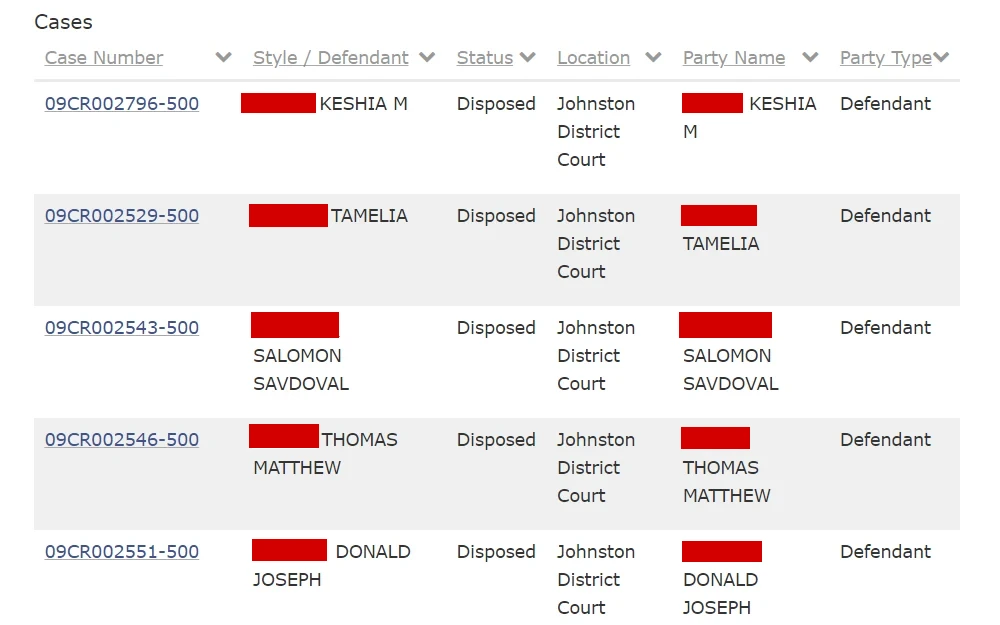
Interested individuals may search for court and criminal records by case number, name, attorney etc.
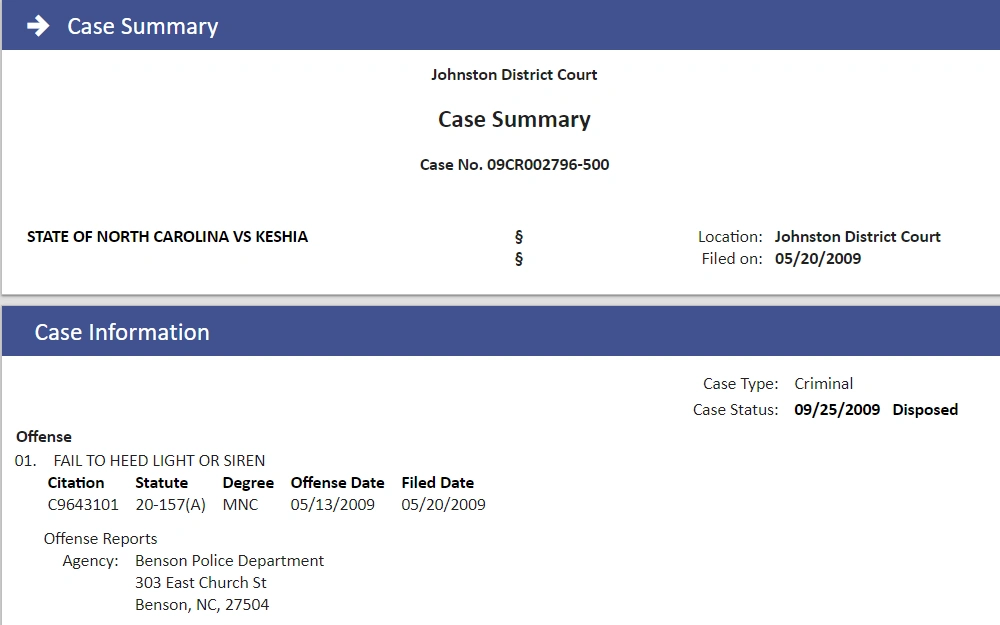
However, background checks cannot be conducted through this portal but should be conducted through the county clerk’s office either through phone, mail or physically visiting the court.
The table below and this Court Locator Tool maintained by the North Carolina Judicial Branch can be used to pinpoint courts that serve counties and cities.8
This table, however, makes it easier since interested individuals can quickly locate the address and phone number of the courts.
| County | County Courthouse Address | Phone Number |
| Alamance County | 1 Court Square Graham, NC 27253 |
(336)570-5200 |
| Alexander County | 29 W Main Ave Taylorsville, NC 28681 |
(828)635-3113 |
| Alleghany County | 12 N Main St Sparta, NC 28675 |
(336)372-3900 |
| Anson County | 114 N Greene St Wadesboro, NC 28170 |
(704)994-3800 |
| Ashe County | 150 Government Cir Jefferson, NC 28640 |
(336)219-1400 |
| Avery County | 200 Montezuma St Newland, NC 28657 |
(828)737-6700 |
| Beaufort County | 112 W 2nd St Washington, NC 27889 |
(252)940-4000 |
| Bertie County | 108 Dundee St Windsor, NC 27983 |
(252)794-6800 |
| Bladen County | 106 W Broad St Elizabethtown, NC 28337 |
(910)872-7200 |
| Brunswick County | 310 Government Center Dr NE Bolivia, NC |
(910)253-3900 |
| Buncombe County | 60 Court Plaza Asheville, NC 28801 |
(828)259-3400 |
| Burke County | 201 S Green St Morganton, NC 28655 |
(828)433-3200 |
| Cabarrus County | 77 Union St S Concord, NC 28025 |
(704)262-5500 |
| Caldwell County | 216 Main St SW Lenoir, NC 28645 |
(828)759-3503 |
| Camden County | 117 N Carolina Hwy 343 S Camden, NC 27921 |
(252)336-4000 |
| Carteret County | 300 Courthouse Square Beaufort, NC 28516 |
(252)504-4400 |
| Caswell County | 139 E Church St Yanceyville, NC 27379 |
(336)459-4000 |
| Catawba County | 100 Government Dr Newton, NC 28658 |
(828)695-6100 |
| Chatham County | 40 E Chatham St Pittsboro, NC 27312 |
(919)545-3500 |
| Cherokee County | 75 Peachtree St Murphy, NC 28906 |
(828)835-7740 |
| Chowan County | 101 S Broad St Edenton, NC 27932 |
(252)368-5000 |
| Clay County | 261 Courthouse Dr # 1 Hayesville, NC 28904 |
(828)389-2300 |
| Cleveland County | 100 Justice Pl Shelby, NC 28150 |
(704)476-7800 |
| Columbus County | 113 Courthouse Sq Whiteville, NC 28472 |
(910)641-4400 |
| Craven County | 302 Broad St New Bern, NC 28560 |
(252)639-3000 |
| Cumberland County | 117 Dick St Fayetteville, NC 28301 |
(910)475-3000 |
| Currituck County | 2801 Caratoke Hwy Currituck, NC 27929 |
(252)232-6200 |
| Dare County | 962 Marshall C Collins Drive Manteo, NC 27954 |
(252)475-5200 |
| Davidson County | 110 W Center St Lexington, NC 27292 |
(336)242-6701 |
| Davie County | 140 S Main St Mocksville, NC 27028 |
(336)936-3000 |
| Duplin County | 112 Duplin St Kenansville, NC 28349 |
(910)275-7000 |
| Durham County | 510 S Dillard St Durham, NC 27701 |
(919)808-3000 |
| Edgecombe County | 301 St Andrew St Tarboro, NC 27886 |
(252)824-3200 |
| Forsyth County | 200 N Main St Winston-Salem, NC 27101 |
(336)779-6300 |
| Franklin County | 102 S Main St Louisburg, NC 27549 |
(919)497-4200 |
| Gaston County | 325 Dr M.L.K. Jr. Way #1004 Gastonia, NC 28052 |
(704)852-3100 |
| Gates County | 202 Court St Gatesville, NC 27938 |
(252)357-1365 |
| Graham County | 12 Court St Robbinsville, NC 28771 |
(828)479-7000 |
| Granville County | 101 Main St Oxford, NC 27565 |
(919)690-4800 |
| Greene County | 301 N Greene St Snow Hill, NC 28580 |
(252)747-6200 |
| Guilford County | 201 S Eugene St Greensboro, NC 27401 |
(336)412-7300 |
| Halifax County | 357 Ferrell Ln Halifax, NC 27839 |
(252)593-3000 |
| Harnett County | 301 W Cornelius Harnett Blvd Lillington, NC 27546 |
(910)814-4400 |
| Haywood County | 285 N Main St Waynesville, NC 28786 |
(828)454-6501 |
| Henderson County | 200 N Grove St Suite 163 Hendersonville, NC 28792 |
(828)694-4100 |
| Hertford County | 119 Justice Drive Winton, NC 2798 |
(252)358-7100 |
| Hoke County | 304 N Main St Raeford, NC 28376 |
(910)878-4100 |
| Hyde County | 40 Oyster Creek St Swanquarter, NC 27885 |
(252)926-4101 |
| Iredell County | 226 Stockton St Statesville, NC 28677 |
(704)832-6600 |
| Jackson County | 104 W Jefferson St Jackson, NC 27845 |
(252)534-1631 |
| Johnston County | 207 E Johnston St Smithfield, NC 27577 |
(919)209-5400 |
| Jones County | 101 Market St Trenton, NC 28585 |
(252)448-6220 |
| Lee County | 1400 S Horner Blvd Sanford, NC 27330 |
(919)718-6300 |
| Lenoir County | 130 S Queen St Kinston, NC 28501 |
(252)520-5300 |
| Lincoln County | 120 Justice Dr Lincolnton, NC 28092 |
(704)742-7800 |
| Macon County | 5 W Main St Franklin, NC 28734 |
(828)349-7200 |
| Madison County | 2 N Main St Marshall, NC 28753 |
(828)649-2200 |
| Martin County | 213 E Main St Williamston, NC 27892 |
(252)809-5100 |
| McDowell County | 21 S Main St Marion, NC 28752 |
(828)655-4100 |
| Mecklenburg County | 832 E 4th St Charlotte, NC 28202 |
(704)686-0400 |
| Mitchell County | 328 Long View Dr Bakersville, NC 28705 |
(828)688-5100 |
| Montgomery County | 108 E Main St Troy, NC 27371 |
(910)571-3700 |
| Moore County | 102 Monroe St Carthage, NC 28327 |
(910)722-5000 |
| Nash County | 234 W Washington St Nashville, NC 27856 |
(252)220-3000 |
| New Hanover County | 316 Princess St Wilmington, NC 28401 |
(910)772-6600 |
| Northampton County | 104 W Jefferson St Jackson, NC 27845 |
(252)574-3100 |
| Onslow County | 625 Court St Jacksonville, NC 28540 |
(910)478-3600 |
| Orange County | 106 E Margaret Ln Hillsborough, NC 27278 |
(919)644-4500 |
| Pamlico County | 202 Main St Bayboro, NC 28515 |
(252)745-6600 |
| Pasquotank County | 206 E Main St Elizabeth City, NC 27907 |
(252)331-4600 |
| Pender County | 100 S Wright St Burgaw, NC 28425 |
(910)663-3900 |
| Perquimans County | 128 N Church St Hertford, NC 27944 |
(252)404-5000 |
| Person County | 105 S Main St Roxboro, NC 27573 |
(336)503-5200 |
| Pitt County | 100 W 3rd St Greenville, NC 27834 |
(252)695-7100 |
| Polk County | One Courthouse Square Columbus, NC 28722 |
(828)894-4900 |
| Randolph County | 176 E Salisbury St Asheboro, NC 27203 |
(336)328-3000 |
| Richmond County | 105 W Franklin St Rockingham, NC 28379 |
(910)419-7400 |
| Robeson County | 500 N Elm St Lumberton, NC 28359 |
(910)272-5900 |
| Rockingham County | 170 Hwy 65 Reidsville, NC 27320 |
(336)634-6000 |
| Rowan County | 210 N Main St Salisbury, NC 28144 |
(704)797-3001 |
| Rutherford County | 229 N Main St Rutherfordton, NC 28139 |
(828)288-6100 |
| Sampson County | 101 E Main St Clinton, NC 28328 |
(910)596-6600 |
| Scotland County | 212 Biggs St # 100 Laurinburg, NC 28352 |
(910)266-4400 |
| Stanly County | 201 S 2nd St Albemarle, NC 28002 |
(704)986-7000 |
| Stokes County | Hwy 89 – 1012 Main St Danbury, NC 27016 |
(336)593-4400 |
| Surry County | 201 E Kapp St Dobson, NC 27017 |
(336)386-3700 |
| Swain County | 101 Mitchell St Bryson City, NC 28713 |
(828)488-7400 |
| Transylvania County | 7 E Main St Brevard, NC 28712 |
(828)885-3000 |
| Tyrrell County | 403 Main St Columbia, NC 27925 |
(252)766-6510 |
| Union County | 500 N Main St Monroe, NC 28112 |
(704)698-3100 |
| Vance County | 156 Church St Henderson, NC 27536 |
(252)430-5100 |
| Wake County | 316 Fayetteville St Raleigh, NC 27601 |
(919)792-4000 |
| Warren County | 109 S Main St Warrenton, NC 27589 |
(252)257-6300 |
| Washington County | 120 Adams St # 1 Plymouth, NC 27962 |
(252)791-4000 |
| Watauga County | 842 W King St # 13 Boone, NC 28607 |
(828)268-6600 |
| Wayne County | 224 E Walnut Street #230 Goldsboro, NC 27530 |
(919)722-6100 |
| Wilkes County | 500 Courthouse Dr Wilkesboro, NC 28697 |
(336)651-4400 |
| Wilson County | 115 Nash St Wilson, NC 27894 |
(252)206-3000 |
| Yadkin County | 101 S State St Yadkinville, NC 27055 |
(336)679-3600 |
| Yancey County | 110 Town Square Burnsville, NC 28714 |
(828)678-5700 |
The North Carolina Administrative Office of the Courts (NCAOC) provides access to criminal and civil court data in all 100 counties in the state through its Remote Public Access Program (RPA). This is, however, reserved for entities that have RPA licensees.
Retrieve Criminal Records via the Remote Public Access Program (RPA) Hosted by the North Carolina Administrative Office of the Courts (NCAOC)
In addition to eCourts which is yet to be made available for all counties, North Carolina has a central public records repository that allows its users to access criminal and record data in all its 100 counties known as the Remote Public Access Program.9 This information is the same that can be obtained from a public terminal at any North Carolina courthouse.
It is also possible to conduct statewide and real-time criminal background checks in the Automated Criminal/Infractions System (ACIS) and the Civil Case Processing System (VCAP).10, 11
The North Carolina General Assembly has provided authorization to NCAOC to enter into contracts with third parties that are non-exclusive to allow for remote electronic access to court records by the public. This service is not free and quite costly, requiring payment and registration for the license to use it.12
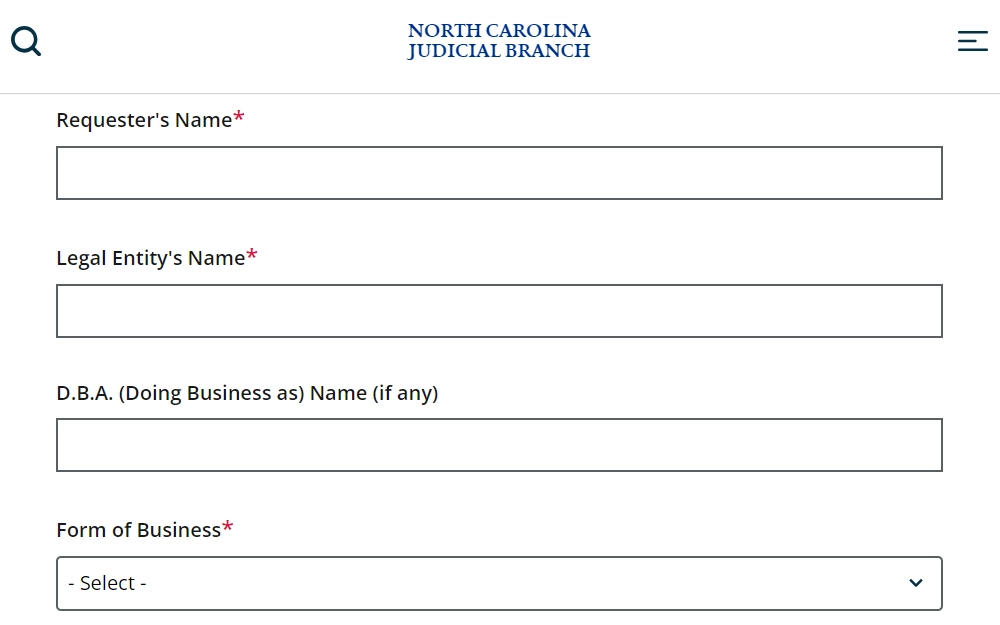
NCAOC offers four criminal extracts and four civil extracts and in addition to other fees found in this extract fee schedule, there is a setup fee of $495 if a historical extract is not purchased.13 A bond amount of $5000 is required to execute an extract licensing agreement with the NCAOC.
How To Obtain a Copy of Criminal Records in North Carolina Through Various Agencies
Interested individuals can obtain copies of North Carolina criminal records through multiple avenues, including law enforcement agencies and the courts—these are outlined below:
- The NC Department of Public Safety collaborates with the court system to provide background checks.14
- The North Carolina Court System contains a complete database of convictions and charges made by the state, county, and city law enforcement agencies against offenders.15
- The State Bureau of Investigation is the primary central repository for criminal information for the state of North Carolina and facilitates finger-based background checks. This is referred to as the “Right to Review” your North Carolina record and costs $14.16
- For federal background checks, the Federal Bureau of Investigation can provide finger-based criminal history background checks known as Identity History Summary Check for an $18 processing fee.17
- Members of the public can also proceed to contact their local county courts from the table above to obtain copies of these records.
The intricacies of how to conduct these checks will be delved into the sections below.
Accessing Probation or Parole Information in NC
Finding whether an offender is on probation or parole is a simple and straightforward process that is facilitated by the North Carolina Department of Corrections which has an easy-to-use Offender Search Tool.
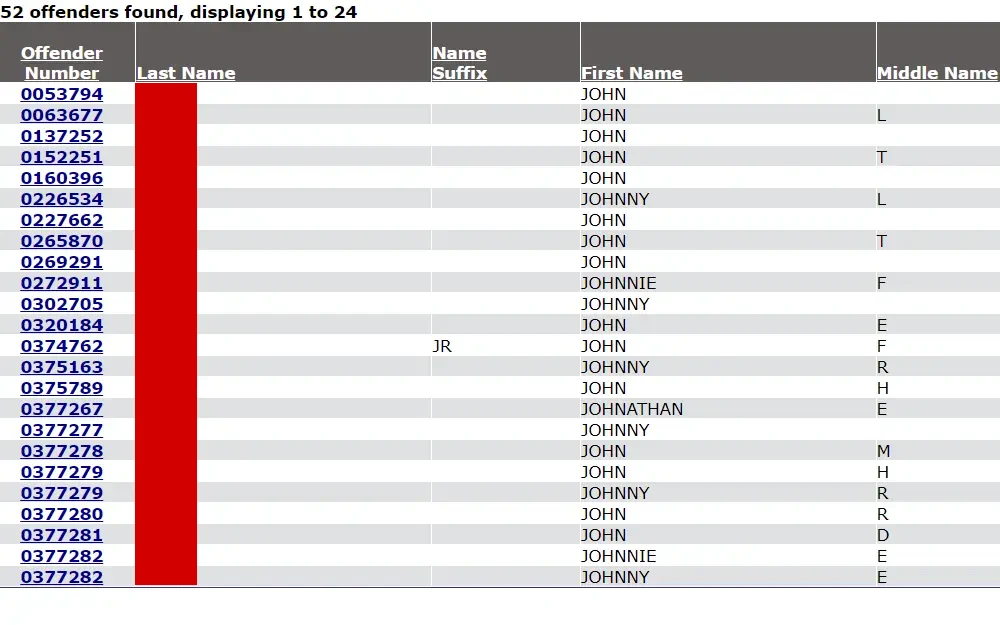
This tool is also generally used to find offenders who are located in state prisons.
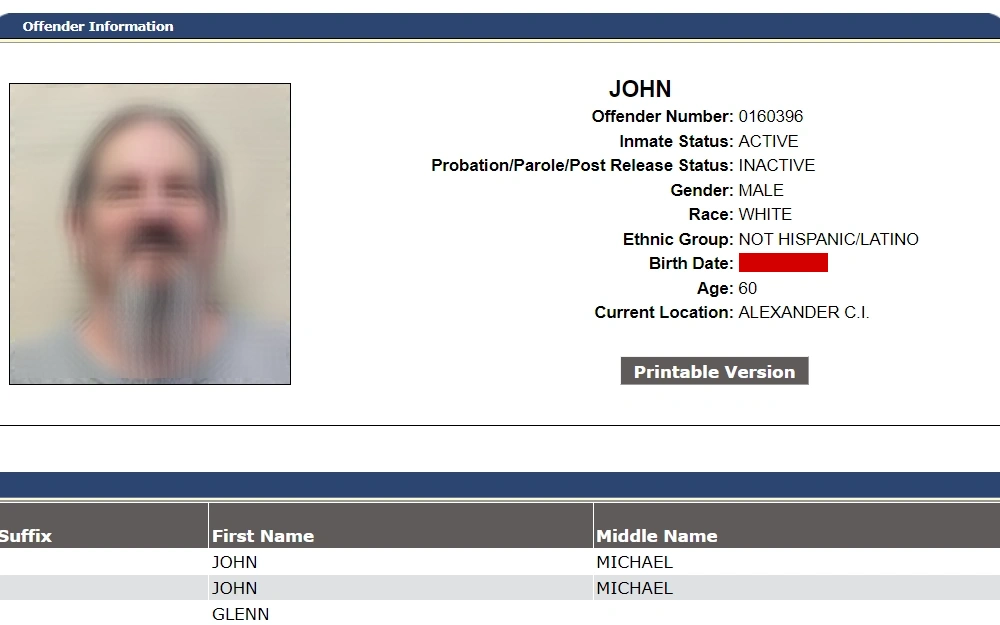
The North Carolina Post-Release Supervision & Parole Commission is an independent agency that oversees the releasing of offenders who meet eligibility requirements set forth by the State’s General Statutes.18
Parole in North Carolina is the conditional and supervised release of an offender prior to the expiration of their prison sentence—probation, on the other hand, is a release that is ordered by the court without any form of imprisonment except as otherwise exempted by law.
To give searchers an idea of how prevalent probation and parole are in North Carolina vs other states, the following image displays the total number of probationers and parolees in the state, compares it with other states across the United States, and contains the ethnicities of individuals on community supervision (probationers and parolees combined) in NC.
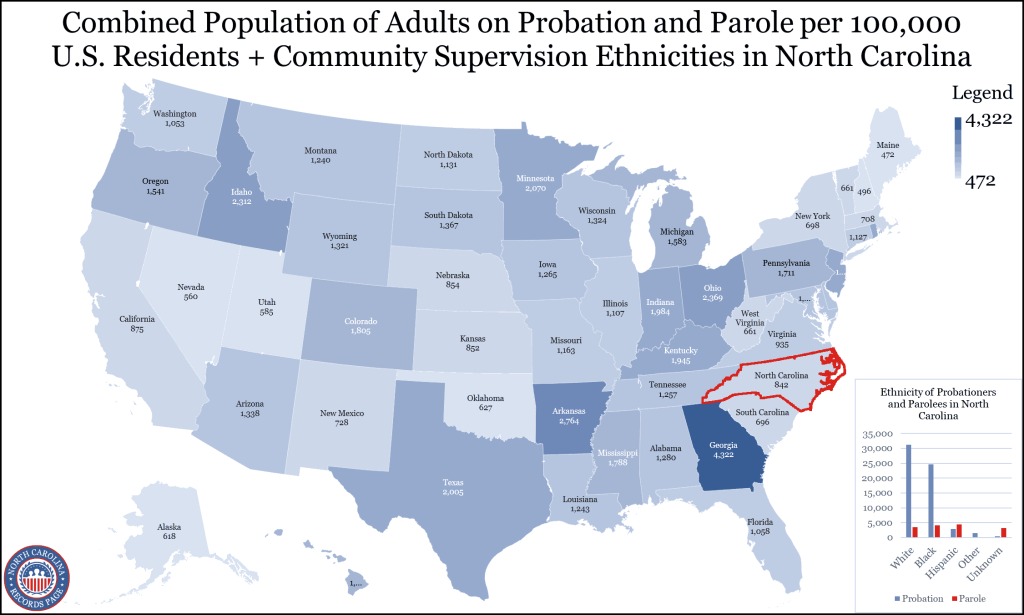
In 1994, the N.C General Assembly eliminated parole and enacted Structured Sentencing—this mandates that crimes that were committed by offenders on or after October 1, 1994, must have the offenders serve 100% of the minimum sentence and 85% of the maximum sentence.19 Once these requirements are met, they are released on post-release supervision.
Those who committed crimes before this date are still eligible for parole.
More details on searching NC parolee information can be reviewed to make for a seamless and effective lookup.
To perform a probation search in North Carolina, members of the public simply open the Offender Search Tool, select the ‘Active Probation/Parolee’ radio button and input the bio-data such as the names, offender number, birth date, and even an age range.
Upon selecting an offender, the status of the probation shows as being active and the inmate status as being inactive.
How Does the Process of Sealing or Expunging a Criminal Record in North Carolina Work
Sealing and expunging North Carolina criminal records has been made a relatively faster and easier process thanks to the new expungement law signed in 2017 known as Senate Bill 445.20
Senate Bill 445’s main goal is to reduce the wait time to expunge felony convictions and misdemeanors (non-violent); components of the change are outlined below:20
- It is possible to expunge misdemeanor convictions after 5 years instead of 15 years.
- Permissible to expunge felony convictions after 10 years rather than 15 years.
- No limit on the number of dismissals that can be expunged.
- Law enforcement and prosecutors will still have access to these records.
Expunction is a legal process that pertains to the removal of a person’s criminal conviction or other charges that were dropped or dismissed.21 Expunctions will generally not make offenders immune from all consequences of their records such as when making determinations in matters regarding federal immigration.
Before being able to petition for an expunction, petitioners should fulfill these criteria:
- Meet required waiting periods
- Pay all court-related costs and have proof of the same
- Cannot be on probation or parole anywhere
- Have no criminal summons or warrant for arrest.
- Have no open criminal cases or pending criminal charges.
To file for a petition for expunction:
- Petitions for expunctions are filed with the clerk of court in the county where the offender was charged.
- The exact process of filing varies by each expunction statute and links to the petition forms of each petition forms for each type of expunction can be accessed conveniently. Each form will have an instruction sheet for each petition.
- Some petitions will require additional supporting documents such as affidavits of good character from people who know the petitioner. This will be detailed in the instructions.
- There is generally a $175 filing fee to file the expunction petition. Nevertheless, some expunctions statutes may not require a fee such as charges that were dismissed or those that ended in a non-guilty verdict.
- Some petitions may require a court hearing where a judge can determine whether the petitioner is of good character.
- The process may take months due to the time required to run criminal record checks and schedule a hearing.
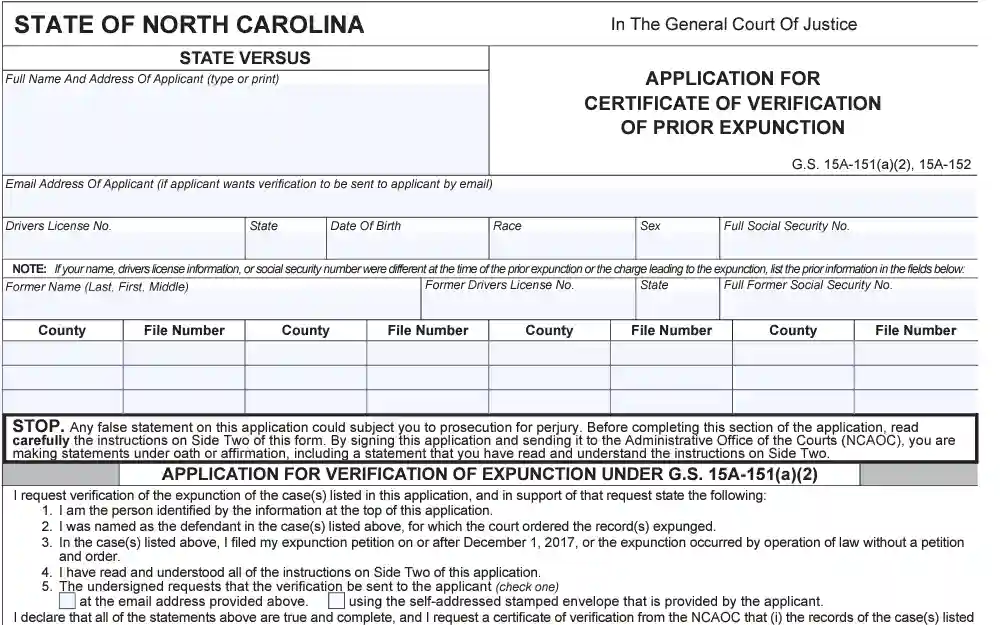
It is possible to self-file for an expunction. However, due to the process being lengthy and quite complicated, any error in filing can lead to major delays in what is already a year-long process. Therefore, it is recommended to hire the services of an attorney.
How To Locate Someone in a Federal Penitentiary or North Carolina State Prison
Prisoners in North Carolina are housed in 57 state prisons dotted throughout the state and 1 federal prison located at the Federal Correctional Complex near Butner.
Interested individuals looking to locate state prisoners can obtain information from the database maintained by the North Carolina Department of Adult Corrections (NC DAC), and federal prison records can be searched through the Federal Bureau of Prisons (BOP).
Federal Prisoner Search
Members of the public can locate federal inmates at the facility in Butner maintained by the Federal Bureau of Prisons (BOP) by querying the Federal Prison Inmate Locator.22
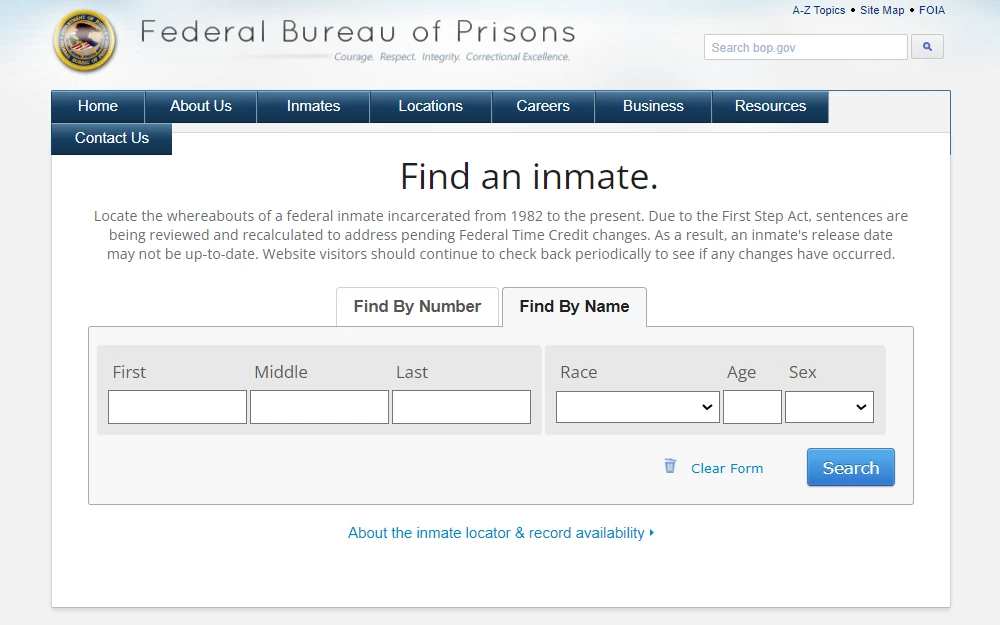
This can be searched using either the last name of the offender or their BOP Register Number. Using this requires no fee and no need for registration.
North Carolina State Prisoner Search
Searching for state prisoners in the state who are housed by the North Carolina Department of Adult Correction is simple, free and straightforward.23
The agency maintains a North Carolina State Prisoner Locator Tool and an Automated System Query (ASQ) Tool. Both tools use the same database, but the latter allows requesters to create customized special reports based on select criteria.
This prison locator tool that doubles up as a people finder can be searched using offender bio-data such as names, offender number, gender and DOB, etc.
The ASQ tool is searched using criteria such as ‘probation’, and ‘community supervisions’ and matching them with ‘entries’ or ‘exits’.
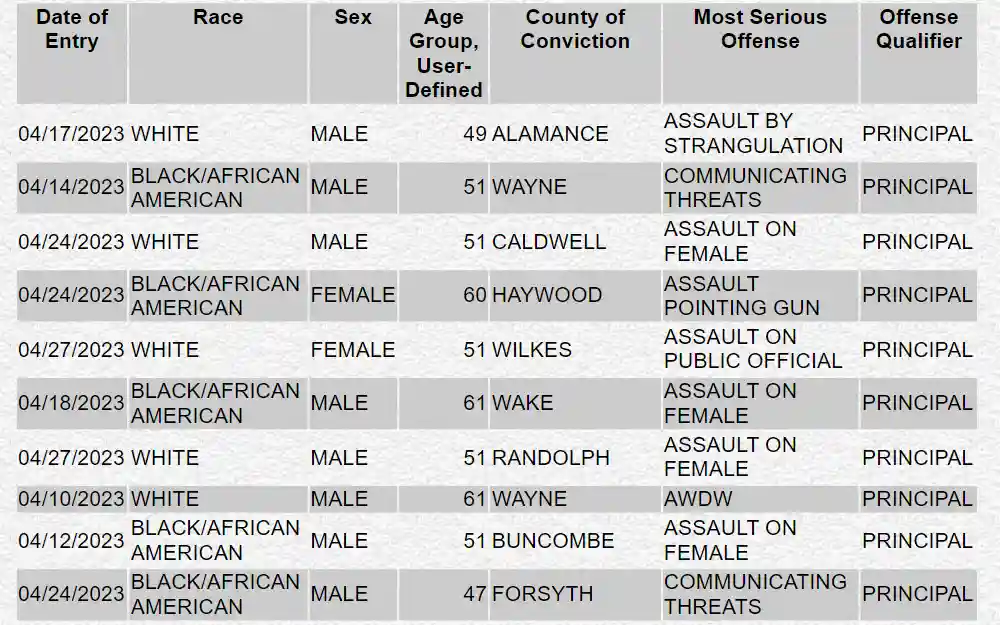
It is possible for family and family to communicate with state prisoners in North Carolina. Inmates located in state prisons can send and receive mail receiving only copies of the mail rather than the original copies.3
All emails are processed by Text Behind, and all mail for inmates should be sent to the company’s facility in Maryland using the format below:
[Name & Opus Number]
[Name of Prison (should not be abbreviated)]
P.O. Box 247
Phoenix, MD 21131
This mailing system prevents the smuggling of contraband into prison facilities, and all mail must be approved before being delivered to offenders.
Inmates who are in the general population with the exception of those in central prison can also make phone calls out of prison but cannot receive calls. If a family member has an emergency that they need to communicate to an offender, then they should contact the facility to explain to staff members and provide the relative contact information to verify the emergency.
GTL (Global Tel*Link) has a contract with the NCDOC, which allows family and friends to purchase telephone time for calls.
How To Determine if Yourself or Someone Else Has an Arrest Warrant (See Who’s Wanted)
The state of North Carolina defines a warrant for arrest as consisting of the crime of the person accused, a direction to arrest the accused person, and the authorization to hold the person to answer to the crimes in which they were accused—it is based upon a showing of probable cause which is either supported either by oath or affirmation.24
Unlike other states in the union, North Carolina does not have an overarching database and search tool that can be used to retrieve warrant information for its citizens. Nevertheless, interested individuals have a number of options to obtain this information, including:
- Querying the North Carolina State Bureau of Investigation (NCSBI)
- Some county sheriffs may provide a warrant list.
- Contacting local county courts
- Third-party websites.
Querying The Querying the North Carolina State Bureau of Investigation (NCSBI)
Due to the Right to Review Process mentioned earlier, members of the public can run a criminal history check with the NCSBI, which will also include warrant information. A written request is sent to the NCSBI to:
Civilian Services Unit: Right to Review
PO Box 29500
Raleigh, North Carolina 27626
Requesters should fill out the Request Form-Right to Review and mail it to the above address along with a $14 certified check or money order made payable to the NC State Bureau of Investigation.25
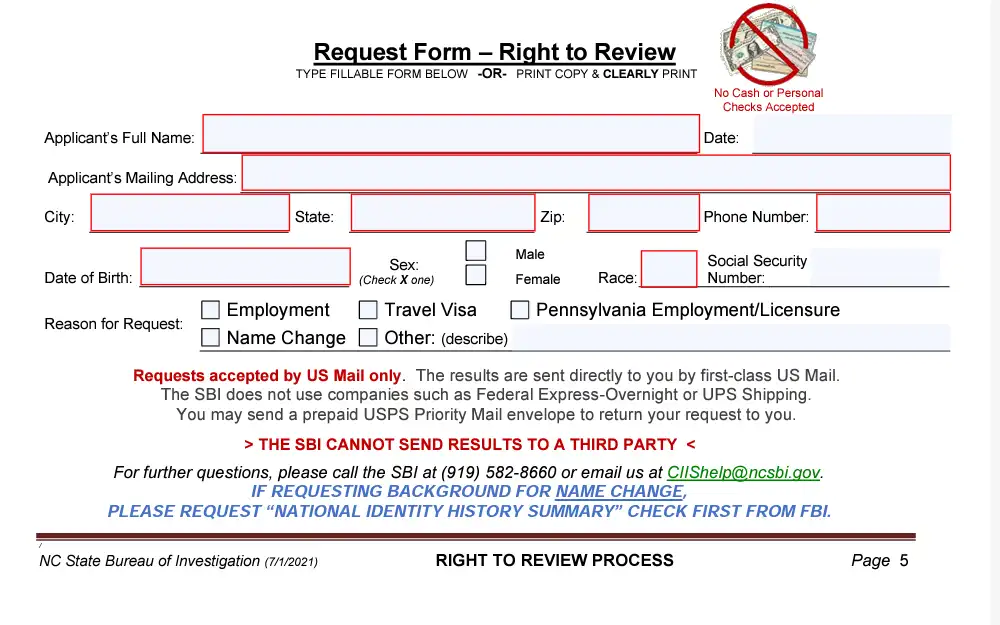
The process should take 2 calendar weeks.
Citizens can also look through the steps for looking up warrants for individuals wanted in North Carolina for clear instructions on finding these records.
County Courts
As the responsibility of issuing warrants lies with the courts, citizens may contact the county courts using the Court Locator Tool to ascertain the status of warrants. The clerks of courts would be the point of contact for this.
County Sheriff’s Office
To see if someone has a warrant out for their arrest, most county sheriff’s offices in North Carolina provide arrest warrant details upon request or have a dedicated online page for warrants. For example, the Rutherford County Sheriff’s Office website mentions that citizens can contact their office, and they’ll provide warrant details.
Third-Party Websites
Some third-party websites may offer a search service that may be used to obtain warrant information for a fee. They generally make the process much simpler, since requesters don’t need to scour around government websites trying to find this information.
How To Get a Background Check Done for Personal or Professional Purposes in NC
Government agencies in the state are mandated to ensure some professions such as caregivers and those engaged in volunteer work to complete background screenings to ensure they don’t have North Carolina arrest records. Many occupations that require state issued licenses such as pharmacists and real estate appraisers will need background checks completed.
These background checks are mandated to ensure public safety and to maintain a high quality of professionalism by individuals to whom these licenses are issued. Background checks primarily fall on the shoulders of:
- The North Carolina Court System: Allows the general public to check other’s criminal history
- The North Carolina State Bureau of Investigation (NCSBI): For professional uses
- Third-party vendors: For professional uses
While it is possible for members of the public to perform a background check on someone else in North Carolina for personal reasons and without consent, background checks that are completed for professional purposes must conform to the guidelines set by the Equal Employment Opportunity Commission (EEOC) and the Fair Credit and Reporting Act (FCRA).
Guidelines like those set forth by the EEOC prohibit employers from conducting background checks and using the information gathered to undermine equal employment opportunities for potential employees.
The FCRA also mandates that employers obtain consent to conduct background checks from potential employees. In addition, it gives employees the right to review the results from the checks and rectify any mistakes and also to appeal any decisions that have been made resulting from the background checks.
Background Check Process via North Carolina’s State Bureau of Investigation (NCSBI)
There are several background checks that can be performed through the NCSBI; these are:
- Personal background checks
- Background checks by employers and licensing entities, as those in the table above
Employers & Licensing Entities
The North Carolina State Bureau of Investigation (NCSBI) performs the role of CJIS Systems Agency (CSA) for the State of North Carolina.
FBI Criminal Justice Information Services (CJIS) is the nation’s central records repository for the information system, providing assistance to state law enforcement and public, governmental, and private entities that share information for criminal justice (CJ) and non-criminal justice (NCJ) purposes.
Agencies such as licensing entities and employees that require background checks have a contract with NCSBI known as an access agreement—these organizations seeking access to Criminal History Record Information (CHRI) must provide the statutory authority to authorize checks for records on applicants and/or employees.
Personal Background Checks
Both North Carolina State and Federal laws allow individuals to request copies of Criminal History Record Information (CHRI) for background checks as methods how to check if someone has a criminal record—fingerprint checks that are done for someone else will require consent:
NC State Fingerprint-Based Check:
- This costs $14, as mentioned earlier, and is a finger-based CHRI check known as the right to review.
- An NC state conducted by the SBI will include a response letter on a letterhead from the SBI. Instruction and more information to complete the Request Form-Right to Review are found here.
National Fingerprint-Based Check:
National checks can be conducted through the Federal Bureau of Investigation (FBI) as aforementioned and are finger-print based. The fastest way to do this is online, which will take 3-5 days, but can also be done by mail, which will take up to 2 months.
Online:
- Proceed to Identity History Summary Checks.
- Follow the steps outlined under the section labeled ‘Obtaining Your Identity History Summary’.
- Obtain fingerprints from participating U.S. post office locations electronically; this option will require the application to be completed online and payment made. Those who don’t choose to use a U.S. post office location may mail their completed fingerprint card along with the confirmation email received when the electronic request was made. These finder print cards can be done at county sheriff’s offices.
- The cost for this check is $18.
By Mail:
- Complete the Applicant Information Form.
- Obtain fingerprints to be placed on a standard fingerprint form (FD-1164) on ink or live scan. This can be done at the county sheriff’s offices.
- The cost of this CHRI (rap sheet) is $18, and payment through credit card is done through this Credit Card Payment Form or money order, which is payable to the Treasury of the United States.
- Mail the required items (signed applicant information form, fingerprint card, and payment of $18 per person) to:
FBI CJIS Division – Summary Request
1000 Custer Hollow Rd
Clarksburg, WV 26306
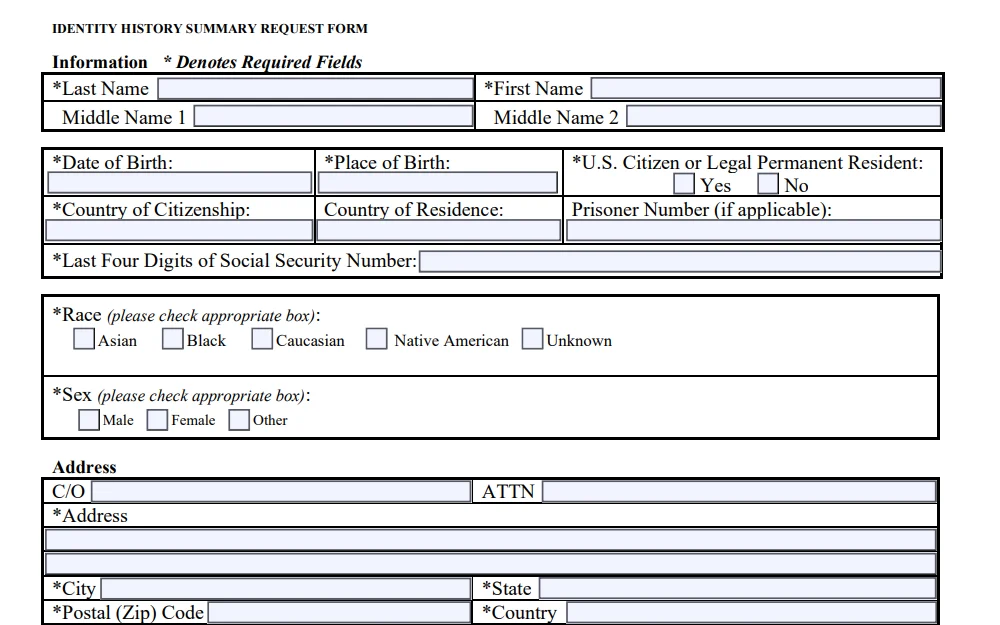
Individuals that do not have a record will receive a response by first-class mail via the USPS stating that they have no prior arrest data while those that do have a record on file will receive a full rap sheet.
Background Checks via the North Carolina Court System & NC Department of Public Safety
The North Carolina court system and the NC Department of Public Safety allow members of the public to run background checks on others and themselves.
North Carolina Court System
- Go to the North Carolina Judicial Branch’s Criminal Background Check page and determine the type of check you need.
- This request for a criminal record search by name for either yourself or others in a single county is done through the clerk of the superior court office. It is not statewide and only for one county.
- Fill out Form AOC-CR-314 and send it to the county court clerk’s office with the fee of $25 which can either be a money order, credit card, or cash.
North Carolina Department of Public Safety (NCDPS)
It is possible to view criminal records for those who have served prison sentences through the NC Department of Adult Corrections, as discussed before. Those who may have committed sex offenses can be viewed through the NC Sex Offender Registry, which is delved into in the next section below.
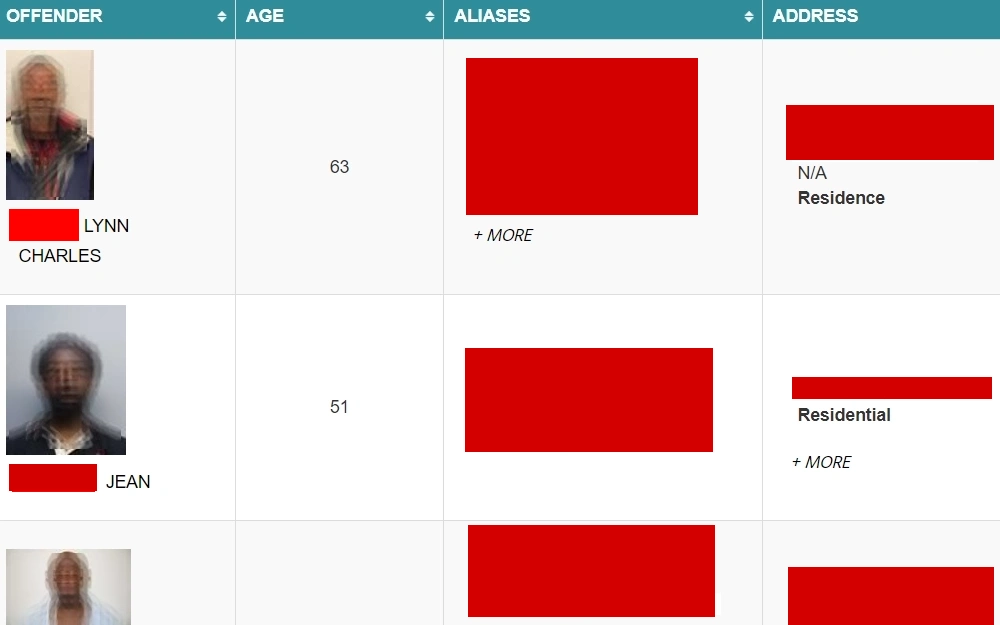
There is also a National Sex Offender Search to locate sex offenders on a national level.
Third-Party Vendors or Criminal Background Check Companies Endorsed by the North Carolina Judicial Branch
Unofficial records can also be performed by third parties that sell information to members of the public. The N.C. Administrative Office of the Courts (NCAOC) has a list of third-party vendors that obtain information from them pursuant to a licensing agreement but does not, however, guarantee the accuracy of information from these vendors.
How To View & Search the North Carolina Sex Offender Registry
The NC General Assembly established the North Carolina Sex Offender & Public Protection Registry in 1996 as per NC Code § 14-208.5, which requires persons convicted of sex crimes to register with law enforcement agencies.26
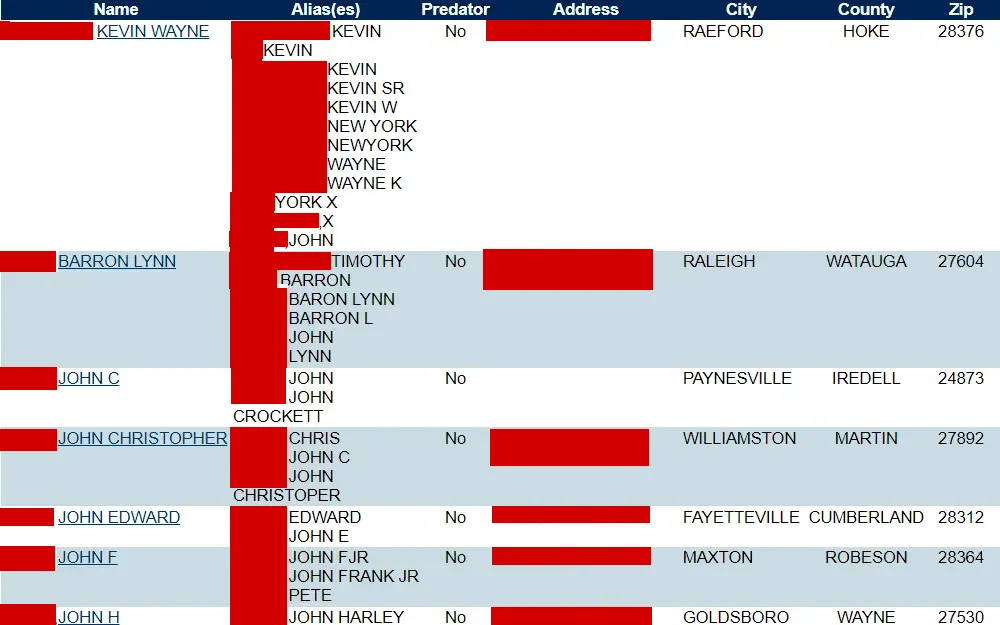
This registry is a resource to inform the public and keep communities safe.
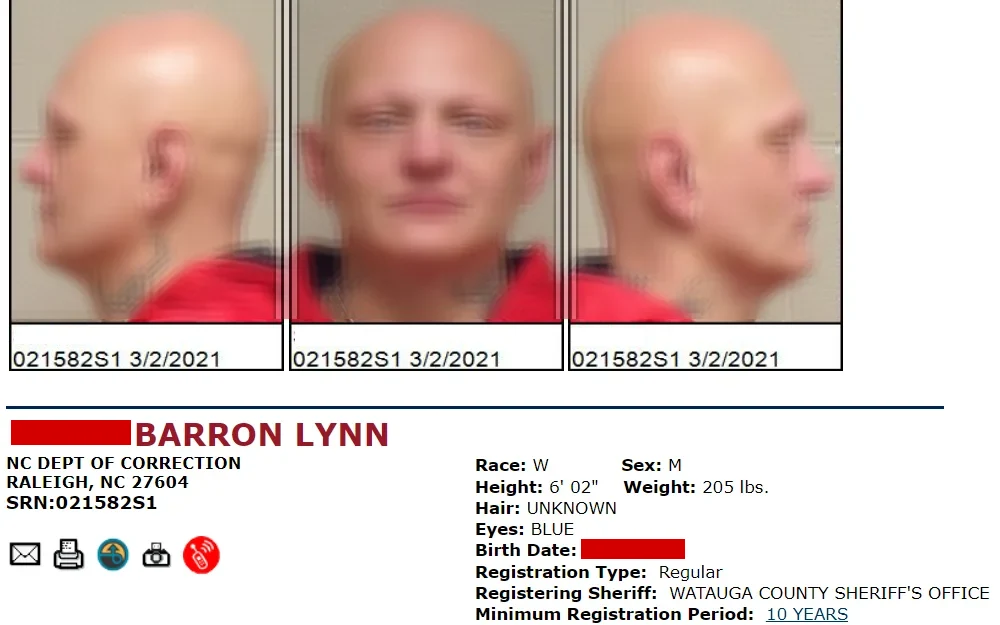
There are multiple ways to find offenders using this felony registry and online directory, including:
- First and Last Name
- By Your Address or a Nearby Address
- Their Sex Offender’s Registration Number
- Latitude and Longitude (for general areas or areas without an actual address)
Your Rights Regarding Criminal & Arrest Records Under North Carolina Laws
While the North Carolina General Statutes § 132-6-6.2 and the Freedom for Information Act (FOIA) give the public the right to access criminal and arrest records at the state and federal levels respectively—there are a number of laws that safeguard citizens’ rights by restricting the access of certain criminal records by the public.
These include laws enforced by government agencies such as the Employment Opportunity Commission (EEOC) and the Fair Credit and Reporting Act (FCRA).
FCRA: The FCRA has guidelines that mandates a 7 year look back rule that consumer reporting agencies (CRA’s) can report on an individual’s criminal history. This period varies between states, with some states having longer or shorter look-back periods.
EEOC: Criminal convictions always get displayed during background checks. Employers who refuse to offer a job to applicants due to a criminal conviction that took place several years before a job application was lodged are in violation of EEOC laws. The reason is due to the EEOC enforcing civil rights in the workplace to prohibit employee discrimination.
Additionally, certain criminal records in North Carolina are not subject to the right of access, including criminal investigation records and records that involve public security.27
Expunction: North Carolina passed an expunction law dubbed Senate Bill 445 which reduces the wait time to file expunctions for felony and misdemeanor convictions. When criminal records are sealed and/or expunged, individuals can now be in a position to legally deny a conviction.
However, expunctions will not make offenders immune from all consequences of their records such as when making determinations in matters regarding federal immigration.
Juvenile Records: Certain criminal records, such as juvenile records, barring those that are extreme in nature, like felonies and murder cases, or records that may jeopardize the safety of inmates and facility personnel, cannot be scrutinized in North Carolina except by court order.
Ban The Box: The state of North Carolina does have a ban the box law in place due to Executive Order No.158 signed in 2020, which:28
- Prohibits employers from requesting potential employee’s criminal background and history in their job applications—rather this is reserved later in the hiring process, as a conditional offer of employment.
- Job applications cannot include questions about criminal records.
- There should be no considerations made on:
- Expunged Records
- Dismissed Charges
- Charges that Deemed the Defendant Not Guilty
- Pardoned Convictions
Ban the box laws make certain that job applicants are first judged by their credentials without the blemish of a criminal history.
It is permissible to perform personal name-based criminal background checks without someone’s consent in North Carolina through the NC Department of Public Safety and the county courts. However, checks that are being completed for professional purposes, such as employment, property management, licensing, etc., must conform to federal and local laws.
With the right direction and guidance, virtually anyone can quickly and easily access North Carolina arrest records and criminal history reports through the official channels detailed in this resource.
References
1Assembly, N. C. (2023). CHAPTER 132 – PUBLIC RECORDS. Retrieved 2023 <https://www.ncleg.gov/Laws/GeneralStatuteSections/Chapter132>
2Branch, N. C. (2023). Obtaining Court Records. Retrieved 2023 <https://www.nccourts.gov/help-topics/court-records/obtaining-court-records>
3Correction, N. C. (2023). Offender Mail. Retrieved 2023 <https://www.dac.nc.gov/divisions-and-sections/prisons/offender-mail>
4Office, J. C. (2023). Jones County Detention Center. Retrieved 2023 <https://jonescountync.gov/departments/sheriffs-office/jones-county-detention-center/>
5Congress, U. (2023). EIGHTH AMENDMENT. Retrieved 2023 <https://www.govinfo.gov/content/pkg/GPO-CONAN-2002/pdf/GPO-CONAN-2002-9-9.pdf>
6BRANCH, N. C. (2023). eCourts. Retrieved 2023 <https://www.nccourts.gov/ecourts>
7BRANCH, N. C. (2023). eCourts Services. Retrieved 2023 <https://www.nccourts.gov/services/ecourts-services#portal-10512>
8BRANCH, N. C. (2023). Locations. Retrieved 2023 <https://www.nccourts.gov/locations>
9BRANCH, N. C. (2023). Remote Public Access Program. Retrieved 2023 <https://www.nccourts.gov/services/remote-public-access-program>
10BRANCH, N. C. (2015, November 9). Automated Criminal/Infractions System (ACIS) User Manual. Retrieved 2023 <https://www.nccourts.gov/documents/publications/automated-criminalinfractions-system-acis-user-manual>
11BRANCH, N. C. (2018, February 2). CIVIL CASE PROCESSING SYSTEM (VCAP). Retrieved 2023 <https://www.nccourts.gov/assets/documents/publications/vcap_user_manual_public_access_0.pdf?VersionId=c4O1bwUP5XazWxet.pDhLVfBl92egtIA>
12BRANCH, N. C. (2023). Required Information from Prospective Licensees. Retrieved 2023 <https://www.nccourts.gov/required-information-from-prospective-licensees>
13BRANCH, N. C. (2023). RPA Extract Access. Retrieved 2023 <https://www.nccourts.gov/services/remote-public-access-program/rpa-extract-access>
14Safety, N. C. (2023). Background Checks. Retrieved 2023 <https://www.ncdps.gov/our-organization/law-enforcement/background-checks>
15BRANCH, N. C. (2023). Criminal Background Check. Retrieved 2023 <https://www.nccourts.gov/help-topics/court-records/criminal-background-check>
16Investigation, N. C. (2023). SBI Forms. Retrieved 2023 <https://ncsbi.gov/Services/SBI-Forms.aspx>
17Investigation, F. B. (2023). Identity History Summary Checks (Rap Sheets). Retrieved 2023 <https://www.fbi.gov/how-we-can-help-you/more-fbi-services-and-information/identity-history-summary-checks>
18North Carolina Department of Correction. (n.d.). Post-Release Supervision & Parole Commission. Retrieved May 06, 2024, from <https://www.dac.nc.gov/divisions-and-sections/post-release-supervision-parole-commission>
19Justice, U. D. (1996). Citizen’s Guide to Structured Sentencing. Retrieved 2023 <https://www.ojp.gov/ncjrs/virtual-library/abstracts/citizens-guide-structured-sentencing>
20CAROLINA, G. A. (2017). SENATE BILL 445. Retrieved 2023 <https://www.ncleg.gov/Sessions/2017/Bills/Senate/PDF/S445v4.pdf>
21BRANCH, N. C. (2023). Expunctions. Retrieved 2023 <https://www.nccourts.gov/help-topics/court-records/expunctions>
22Federal Bureau of Prisons. (2023). Retrieved 2023 <https://www.bop.gov/>
23Correction, N. C. (2023). North Carolina Department of Adult Correction. Retrieved 2023 <https://www.dac.nc.gov/>
24Assembly, N. C. (2023). Warrant for arrest. Retrieved 2023 <https://www.ncleg.gov/EnactedLegislation/Statutes/HTML/BySection/Chapter_15a/GS_15a-304.html>
25Investigation, N. C. (2021). Right to Review Process. Retrieved 2023 <https://www.ncsbi.gov/Services/SBI-Forms/SBIRight-to-Review__FILLABLE-2021.aspx>
26Assembly, N. C. (1996). Sex Offender and Public Protection Registration Programs. Retrieved 2023 <https://www.ncleg.gov/EnactedLegislation/Statutes/PDF/BySection/Chapter_14/GS_14-208.5.pdf>
27Bluestein, F. S. (2012). Public Records in North Carolina. Retrieved 2023 <https://www.sog.unc.edu/sites/default/files/course_materials/public_records_overview.pdf>
28Governor, N. C. (2020, August 18). Executive Order No. 158. Retrieved 2023 <https://governor.nc.gov/documents/files/executive-order-no-158/open>
29Inmate Inquiry. Cabarrus Sheriff Office. (n.d.). Retrieved July 3, 2023 <https://onlineservices.cabarruscounty.us/p2c/InmateDetail.aspx?navid=638240804264978159>
30ECourts Portal. North Carolina Judicial Branch. (n.d.). Retrieved June 16, 2023 <https://portal-nc.tylertech.cloud/Portal/Home/WorkspaceMode?p=0>
31Register of Actions. North Carolina Judicial Branch. (n.d.). Retrieved June 16, 2023 <https://portal-nc.tylertech.cloud/app/RegisterOfActions/#/5F2E9D7D1D6D4C4B730349EFF7F6BC9731DD193F10C57533A3130683DFB7434E/anon/portalembed>
32Offender Search. North Carolina Department of Adult Correction. (n.d.). Retrieved June 16, 2023 <https://webapps.doc.state.nc.us/opi/offendersearch.do;jsessionid=uqTzlAa4kgGbSUo1xHNJ4LM99CdQHzZBfGtu7D2e.wv6jfhap97p_720?method=list>
33Offender Search Information. North Carolina Department of Adult Correction. (n.d.). Retrieved June 16, 2023 <https://webapps.doc.state.nc.us/opi/viewoffender.do?method=view&offenderID=0160396&searchLastName=Smith&searchFirstName=John&searchDOBRange=0&listurl=pagelistoffendersearchresults&listpage=1>
34Application For Certificate of Verification of Prior Expunction Form. North Carolina Judicial Branch. (n.d.). Retrieved June 16, 2023 <https://www.nccourts.gov/assets/documents/forms/g260_4.pdf?VersionId=3.BS8LHNuY_f45xasdLvHUc65Eh99Fl>
35Inmate Locator. Federal Bureau of Prisons. (n.d.). Retrieved June 16, 2023 <https://www.bop.gov/inmateloc/>
36Automated System Query (ASQ) Tool. North Carolina Department of Correction. (n.d.). Retrieved June 16, 2023 <https://webapps.doc.state.nc.us/apps/asqExt/ASQ>
37Identity History Summary Request Form. Federal Bureau of Investigation. (n.d.). Retrieved June 16, 2023 <https://forms.fbi.gov/identity-history-summary-checks-review/q384893984839334.pdf>
38National Sex Offender Search. Dru Sjodin National Sex Offender Public Website. (n.d.). Retrieved June 16, 2023 <https://www.nsopw.gov/en/Search/Results>
39North Carolina State Bureau of Investigation. (2024). North Carolina Offender Registry. Retrieved May 06, 2024, from <https://sexoffender.ncsbi.gov/disclaimer.aspx>
40North Carolina Offender Registry. North Carolina State Bureau of Investigation. (n.d.). Retrieved June 16, 2023 <https://sexoffender.ncsbi.gov/details.aspx?SRN=021582S1>
